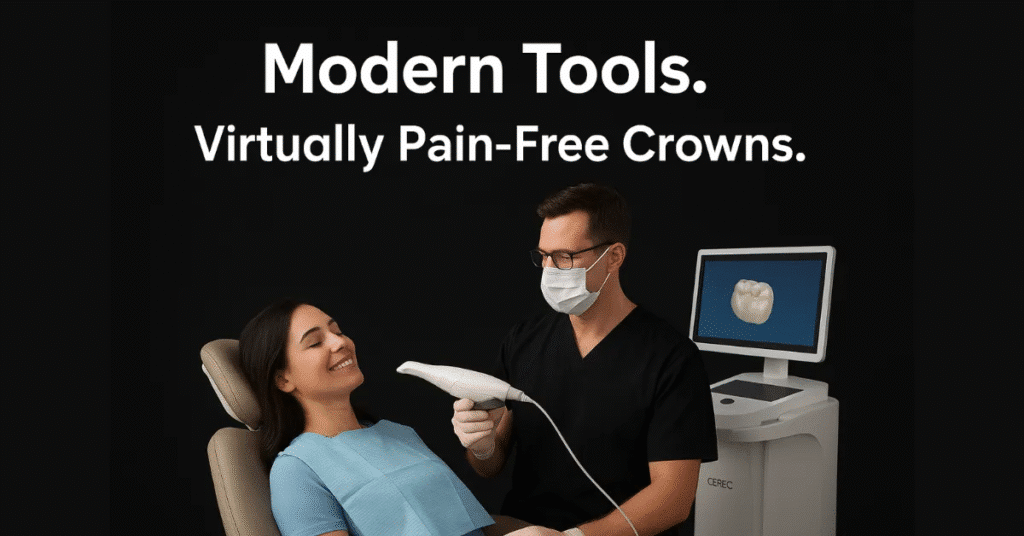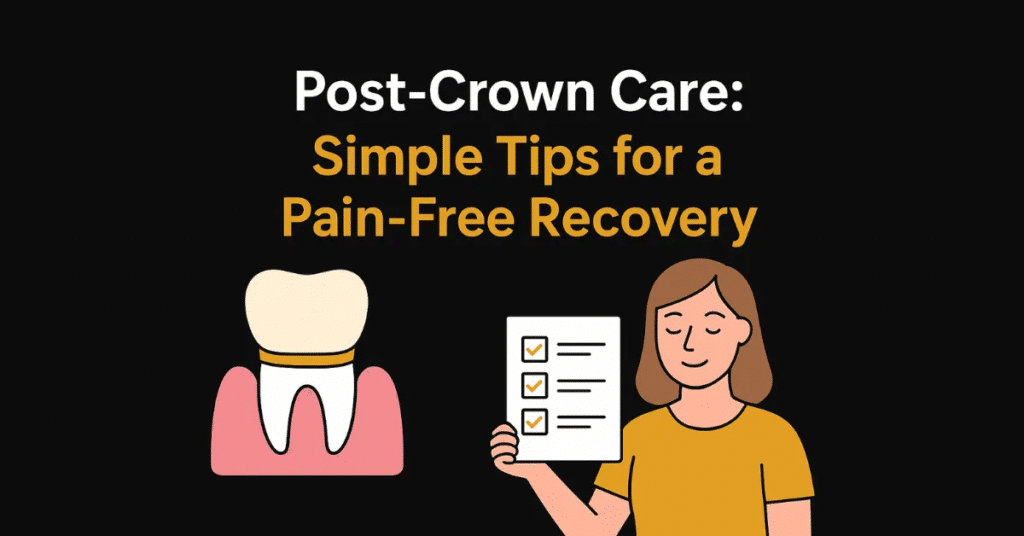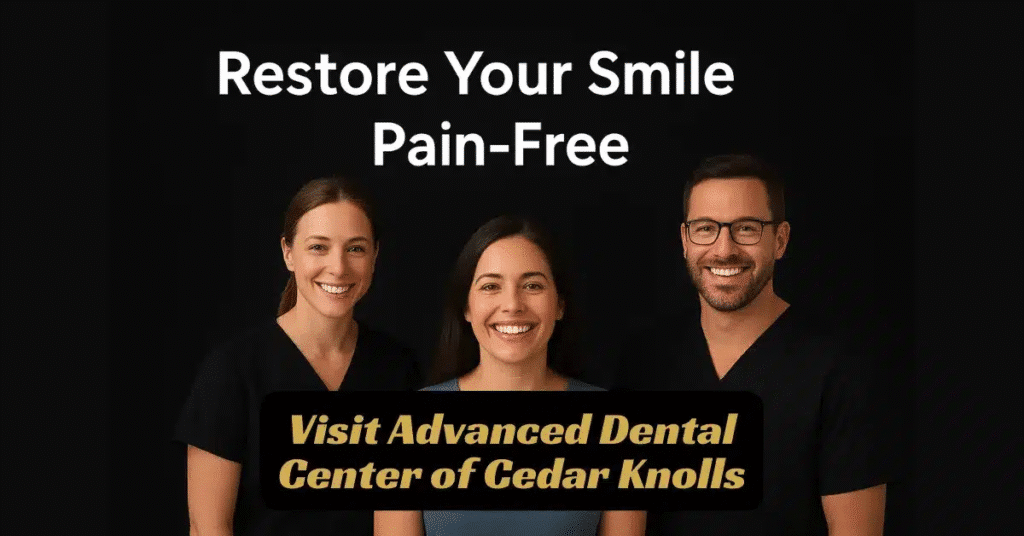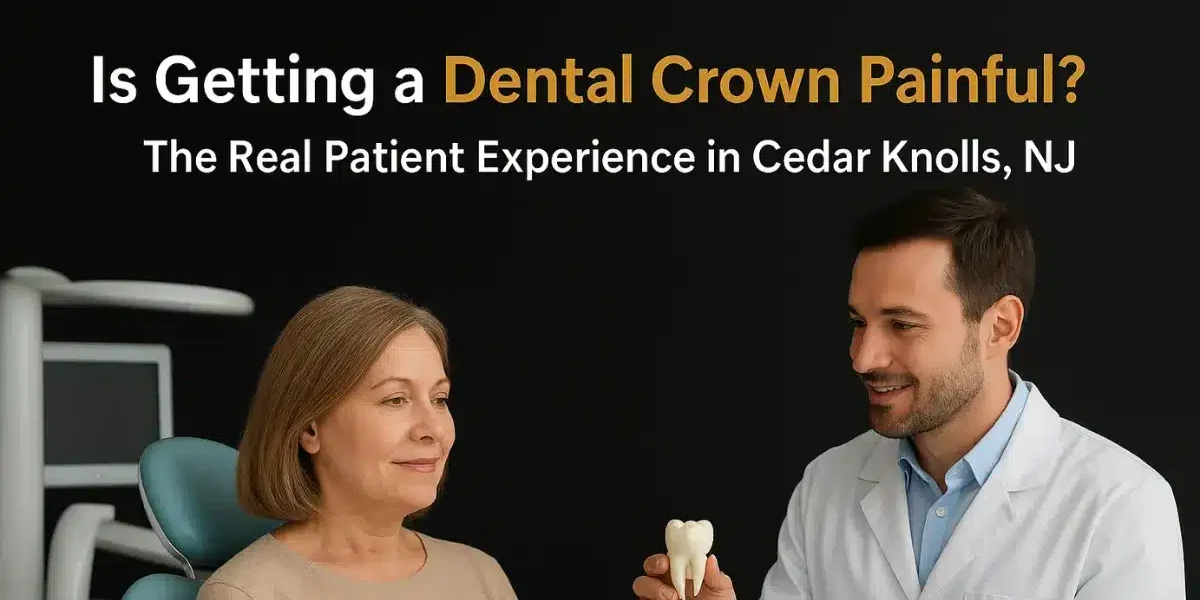What to Expect During a Dental Crown Procedure
When your dentist mentions you might need a dental crown, one thought often comes first, will it hurt?
Many people picture sharp tools, long appointments, and aching teeth afterward. But here’s the good news: modern dentistry has made the dental crown procedure virtually pain-free.
If you live in or around Cedar Knolls, Hanover, Morristown, or surrounding Morris County communities, understanding the process and what actually causes (or prevents) pain can make your experience smoother and stress-free.
This guide from The Advanced Dental Center covers everything, from preparation to recovery, with real insight into how crowns work, what kind of discomfort is normal, and how to avoid it entirely.
Understanding Why Dental Crowns Are Needed
A crown is essentially a strong, custom-designed “cap” that covers a damaged, weak, or misshapen tooth.
It restores strength, structure, and a natural appearance.
You might need a crown if you have:
- A cracked or broken tooth that can’t be filled
- Severe decay after repeated fillings
- A large cavity that compromises the tooth’s strength
- A tooth that’s undergone endodontic therapy (root canal)
- Cosmetic concerns requiring shape or color correction
Crowns are also essential for supporting affordable dental bridges or completing dental implant treatments, such as affordable dental implants in NJ.
The Dental Crown Procedure | Step by Step
Understanding each stage helps eliminate fear. Here’s what typically happens during your visit at a trusted cedar dentist:

1. Comprehensive Examination and Imaging
The process begins with an exam and sometimes a high-resolution CBCT scan dental.
This allows your dentist to see beneath the surface, ensuring no hidden decay or infection remains.
If your tooth is severely compromised, a temporary inlay or onlay (inlay onlay restorations) may be used first for extra stability.
2. Tooth Preparation
Local anesthesia is used to numb the area completely.
You’ll feel gentle pressure, but no sharp pain. The dentist then reshapes the tooth so the crown can fit snugly.
If decay or structural weakness is detected, a core build-up may be added before crown placement.
Modern materials like porcelain/ceramic dental crowns are preferred for their natural appearance and comfort.
3. Digital Impression & Crown Fabrication
Using digital scanners, your dentist captures a precise 3D model of your mouth.
These are far more accurate (and comfortable) than traditional putty impressions.
If you choose CEREC same-day crowns, your crown can be designed, milled, and permanently fitted in a single visit, no waiting weeks for a lab-made restoration.
4. Temporary Crown (If Needed)
For traditional crowns, a temporary one is fitted for about 1, 2 weeks.
During this time, avoid sticky foods and chew on the opposite side to prevent irritation.
5. Permanent Crown Placement
Once your final crown is ready, your dentist removes the temporary one, checks the fit, and bonds it with strong dental cement.
This step is quick and painless, and once done, you can eat normally again within a few hours.
So, Do Dental Crowns Hurt?
It’s a common misconception that crown procedures are painful.
With modern anesthetics and precision tools, dental crown pain during treatment is minimal to none.
However, some mild tenderness or gum sensitivity afterward is normal.
You may feel a dull ache when biting down, known as occlusal sensitivity, or slight gum soreness near the treated area.
This usually fades in 2-3 days and can be managed easily with over-the-counter pain relievers.
Common Reasons for Pain After Dental Crown Placement
Not all post-treatment pain is the same. Understanding what’s normal, and what’s not helps you take quick action.
1. High Bite or Uneven Crown Fit
If your crown is slightly higher than the surrounding teeth, it can cause tooth pain after crown placement.
Your dentist can fix this easily with a small adjustment during a follow-up visit.
2. Inflamed Nerves
The natural tooth underneath your crown may remain sensitive after shaping.
If your crown was placed after a root canal, you might feel minor gum tenderness but not nerve pain, since the nerve has been removed.
3. Gum Irritation
After crown placement, gums might feel sore, especially near adjacent fillings or teeth bonding (bonding white fillings).
Rinsing with warm salt water helps speed healing.
4. Underlying Infection
In rare cases, persistent pain could signal infection under the crown.
Your dentist might suggest re-treatment or additional endodontic therapy to save the tooth.
How to Manage Pain After a Dental Crown

Pain after dental crown placement is usually temporary and mild.
Here’s what experts and the American Dental Association (ADA) recommend for relief:
- Avoid hot, cold, or sticky foods for the first few days.
- Use a soft-bristle toothbrush to clean gently around the crown.
- Rinse with salt water (½ teaspoon salt in a glass of warm water).
- Take ibuprofen or acetaminophen as needed for minor discomfort.
- Schedule a bite adjustment if you notice uneven pressure.
If pain lasts more than a week or becomes throbbing, it’s best to contact your local dental urgent care (emergency dentistry in Cedar Knolls) immediately.
Materials Matter, Crown Type & Comfort Level
The comfort you feel isn’t just about the dentist, it’s also about the crown’s material.
Common types include:
| Material | Comfort Level | Durability | Looks |
| Porcelain / Ceramic | Excellent | 10-15 years | Natural, translucent |
| E-max (Lithium Disilicate) | Excellent | 15+ years | Superior aesthetics |
| Metal / Gold | Moderate | 20+ years | Functional, not aesthetic |
| Zirconia | Very High | 15-20 years | Strong and lifelike |
If you’re comparing E-max crowns costs, this detailed cost guide explains why they’re popular among patients in Cedar Knolls, Hanover, Morristown, and surrounding Morris County communities, who seek both beauty and durability.
For cosmetic concerns, veneers or dental facings (crowns vs veneers explained) may also be alternatives to crowns.
What About the Cost of a Dental Crown in New Jersey?
Cost is another concern alongside comfort.
The cost of a dental crown in New Jersey depends on:
- Type of crown (porcelain, E-max, zirconia)
- Lab vs same-day CEREC fabrication
- Tooth location
- Dentist’s experience and technology
- Insurance coverage
Porcelain crowns are usually mid-range, while CEREC same-day crowns and E-max options may cost slightly more, but last longer and look far more natural.
Some patients combine crowns with porcelain veneers before and after treatments to create a uniform, flawless smile.
Alternatives: Veneers, Bonding & Implants
If your tooth isn’t severely damaged, you may not need a crown at all.
Options include:
- Permanent veneers or clip-on teeth veneers (cost breakdown) for cosmetic enhancement.
- Dental bonding for small chips or cracks.
- Affordable dental implants NJ if the tooth cannot be saved.
- Removable partial dentures or overdenture locators if multiple teeth are missing.
Your dentist will assess which approach ensures maximum comfort, aesthetics, and function, without unnecessary pain.
Patient Example: Sarah’s Story from Cedar Knolls
Sarah, a 42-year-old patient, chipped her molar while chewing ice. She feared the worst, pain, injections, and weeks of soreness.
Instead, after her CEREC same-day crown appointment, she reported:
“I felt no pain at all. The numbing worked perfectly, and I was eating soft food by dinner. The new crown feels like my real tooth!”
This kind of feedback is common when technology and skill come together under expert care.
Expert Tips to Prevent Dental Crown Pain Long-Term
- Maintain excellent oral hygiene, brush and floss daily.
- Avoid biting hard objects (like ice or pens).
- Get professional cleanings twice a year at your family dental care provider.
- Address TMJ-related pain early with TMJ pain relief.
- Consider whitening after treatment using the best teeth whitening NJ options to enhance your overall smile.
Remember, discomfort shouldn’t be part of your dental routine. The right care, crown type, and dentist make all the difference.
Is Dental Crown Pain Something to Fear?
Not at all.
When done by skilled professionals using the latest tools, getting a dental crown is not painful, it’s comfortable, efficient, and rewarding.
Most patients experience little more than mild post-procedure sensitivity, easily managed with basic care.
The long-term benefit? A stronger, more confident smile that feels completely natural.

If you’re ready to restore your smile or fix a crown for a broken tooth, visit your local experts at Advanced Dental Center of Cedar Knolls.
Their modern approach ensures every patient leaves pain-free and smiles brighter than ever.







